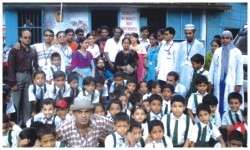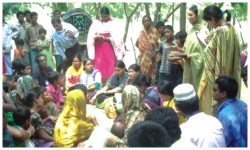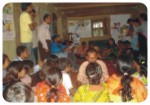| Travelogue
A Visit to Shitakunda
Farooque Hossain Kamrul
 The scorching heat was raging on and the sky was sunny, cloudless and crystal clear. In was in this settings we had to go to Shitakunda, Chittagong, for a 3-day visit for the partial fulfillment of our TPD (Trainee Professional with Disability) program. This was a training program implemented by YPSA (Young Power in Social Action- a local specialized social development organization) under the aegis of AAB (Action Aid Bangladesh) and HSBC (Hong Kong Shanghai Banking Corporation), comprising twenty higher-educated differentially able people from various parts of the country. We got on the car to Sitakunda at 2.15 sharp. The car was heading for the Human Resource Development Center (HRDC) of YPSA. All of us were mesmerized seeing the green surroundings and serene beauty of the area. The YPSA personnel there gave us a cordial reception. We had a brief discussion on the proceedings of the next two days with Mr Harun - our program organizer. As time progressed and the sun was setting, Iftar (fast-breaking) time approached and that we had Iftar in a befitting manner. As we were tired from the journey, we went to bed early. The scorching heat was raging on and the sky was sunny, cloudless and crystal clear. In was in this settings we had to go to Shitakunda, Chittagong, for a 3-day visit for the partial fulfillment of our TPD (Trainee Professional with Disability) program. This was a training program implemented by YPSA (Young Power in Social Action- a local specialized social development organization) under the aegis of AAB (Action Aid Bangladesh) and HSBC (Hong Kong Shanghai Banking Corporation), comprising twenty higher-educated differentially able people from various parts of the country. We got on the car to Sitakunda at 2.15 sharp. The car was heading for the Human Resource Development Center (HRDC) of YPSA. All of us were mesmerized seeing the green surroundings and serene beauty of the area. The YPSA personnel there gave us a cordial reception. We had a brief discussion on the proceedings of the next two days with Mr Harun - our program organizer. As time progressed and the sun was setting, Iftar (fast-breaking) time approached and that we had Iftar in a befitting manner. As we were tired from the journey, we went to bed early.
 For the next two days, we had a hectic schedule. It is necessary to mention here that YPSA conducts all its activities under a program named DISC, which stands for Development Initiative for Social Change. In a broad sense, DISC is a comprehensive approach that addresses some key factors of community-based rehabilitation of person with disabilities (PWDs) in an integrated manner. The range of the DISC program is vast. It conducts different activities for the disabled and distressed people of the society. For the next two days, we had a hectic schedule. It is necessary to mention here that YPSA conducts all its activities under a program named DISC, which stands for Development Initiative for Social Change. In a broad sense, DISC is a comprehensive approach that addresses some key factors of community-based rehabilitation of person with disabilities (PWDs) in an integrated manner. The range of the DISC program is vast. It conducts different activities for the disabled and distressed people of the society.
Below is a description of the affairs we observed and explored.
YPSA Health Service Centre:
It consists of two well-equipped rooms, the Therapy Centre and the Clinic. Paralyzed patients of all ages come here for treatment and physiotherapy. The center provides all kinds of medicines at 25% reduced rate for the poor and distressed patients. The therapy center is equipped with various state-of-the-art machineries. There are four workers including a doctor who provide daylong services.
Disability and Education:
 Primary education is a basic right. To ensure this right, YPSA is conducting an exceptional program. It has set up a school named Evergreen International School to enlighten the poor and disabled children of the society with primary education. This school conducts their activities from playgroup to Class Five. There are 175 students in this school of whom seven are disabled. There is also an opportunity for the children to receive education for free. One noticeable thing is a wide ramp at the entrance of the classroom for the physically challenged. This catches the eyes of every visitor and reminds them of the YPSA's consideration for all kinds of people in society. There is a Shishu Mela at Daliapara in Sitakunda where children receive education through entertainment such as music, drawing, indoor games etc. Primary education is a basic right. To ensure this right, YPSA is conducting an exceptional program. It has set up a school named Evergreen International School to enlighten the poor and disabled children of the society with primary education. This school conducts their activities from playgroup to Class Five. There are 175 students in this school of whom seven are disabled. There is also an opportunity for the children to receive education for free. One noticeable thing is a wide ramp at the entrance of the classroom for the physically challenged. This catches the eyes of every visitor and reminds them of the YPSA's consideration for all kinds of people in society. There is a Shishu Mela at Daliapara in Sitakunda where children receive education through entertainment such as music, drawing, indoor games etc.
Rights and Disability:
 There are some social rights along with basic human rights. To realize these rights, YPSA has set up several Janakendra (Public Centers) under the auspices of AAB. Through these Janakendras, YPSA is dealing with social right and solutions of various problems for the disabled, underprivileged and poor people of the society. With the efforts of YPSA through these Kendras, the underprivileged section of the society is enjoying various benefits. Let me tell you the story of one Tajul Islam, who is physically challenged and used to beg in order to support his family. YPSA gave him a three-wheeler and some financial assistance through Madhyapara Janakendra. As a result, he can now move freely and is earning his livelihood by selling fruits. This is how YPSA is trying to involve the disabled and poor people of the society in the mainstream through rehabilitation activities. There are some social rights along with basic human rights. To realize these rights, YPSA has set up several Janakendra (Public Centers) under the auspices of AAB. Through these Janakendras, YPSA is dealing with social right and solutions of various problems for the disabled, underprivileged and poor people of the society. With the efforts of YPSA through these Kendras, the underprivileged section of the society is enjoying various benefits. Let me tell you the story of one Tajul Islam, who is physically challenged and used to beg in order to support his family. YPSA gave him a three-wheeler and some financial assistance through Madhyapara Janakendra. As a result, he can now move freely and is earning his livelihood by selling fruits. This is how YPSA is trying to involve the disabled and poor people of the society in the mainstream through rehabilitation activities.
Rights in ICT and Disability:
The present era is that of Information and Communication Technology (ICT). Information is needed for the disabled as much as by other people in society. To ensure access to ICT for the disabled, YPSA has initiated an innovative step under its DISC program. It includes these points:
*To establish knowledge centres and provide documentation
*To impart computer training for people with disabilities through the Youth Community Multimedia Center (YCMC)
As we know, getting proper information is a social right. To conserve this right, YPSA has been conducting an activity since 2003 by setting up an ICT centre near Sitakunda Bazar with assistance from UNESCO. Under this there are three projects such as YPRD, YCMC and IPDC.
The YPRD project is imparting computer skills to the disabled and poor. In some cases, disabled people are receiving training free of cost. Under the YCMC project a studio has been established from where social awareness programs are being broadcast for nearly 2000 families. Through Community Radio, people in this locality are being informed of the weather condition, agricultural news and various important cultural, social and national events in their own language.
YPSA Herbarium Activities:
This is said to be a unique effort of YPSA. To recognize the traditional and nearly extinct plants as well as to collect these are the main purpose of this herbarium. For this, YPSA has set up a herbarium laboratory where samples of many plants have been preserved. It is said that the herbarium is playing a vital role in preserving medical and fruit-bearing plants as well as biodiversity.
Recreational Tour:
 Entertainment is an inextricable part of life. Realizing this, there have been some recreational tours. Of these, Chandranath Hill was the first. The hill has narrow zigzag paths surrounded by numerous green trees. It is deemed as a sacred place for the Hindu community. Many visitors come here everyday from every part of the country. There is a small waterfall that has enriched the natural beauty of the hill. Then comes the Bashkhali Sea Beach. Surrounded by green tamarisk trees, the beauty of the beach is indescribable. It was tide when we reached there. The heavy waves of the sea were hitting the beach as if there is an intense friendship between the beach and the vast sea. At last, we went to Sitakunda eco-park, which is filled with a myriad of various medical, fruit-bearing and forest-born trees. Many serpentine paths have passed through the hill and we went to the hilltop climbing the path. A natural spring was also there and luckily some of us were able to take bath under the heavy dropping of the cataract. It was 5.00 pm when we returned to HRDC of Sitakunda. Entertainment is an inextricable part of life. Realizing this, there have been some recreational tours. Of these, Chandranath Hill was the first. The hill has narrow zigzag paths surrounded by numerous green trees. It is deemed as a sacred place for the Hindu community. Many visitors come here everyday from every part of the country. There is a small waterfall that has enriched the natural beauty of the hill. Then comes the Bashkhali Sea Beach. Surrounded by green tamarisk trees, the beauty of the beach is indescribable. It was tide when we reached there. The heavy waves of the sea were hitting the beach as if there is an intense friendship between the beach and the vast sea. At last, we went to Sitakunda eco-park, which is filled with a myriad of various medical, fruit-bearing and forest-born trees. Many serpentine paths have passed through the hill and we went to the hilltop climbing the path. A natural spring was also there and luckily some of us were able to take bath under the heavy dropping of the cataract. It was 5.00 pm when we returned to HRDC of Sitakunda.
The main purpose of the visit was to gain a hands-on experience of YPSA and AAB. We, the twenty disabled youth, have learned many critical things from this visit. We have explored real life from up close. That's why through this article I want to give the message that 'Disability is not inability, but different ability', and the disabled can do the same thing in a different way. Please don't consider them as burdens to society. The disabled don't need help or mercy from you, all they require is some assistance. This way, they will be able to prove their worth, their mettle and their potential.
Farooque Hossain Kamrul
(B.Sc & M.Sc in Computer Science and Engineering I.U. Kushtia)
TPD (Trainee Professinoal with Disability) Trainee
Copyright
(R) thedailystar.net 2007 |
